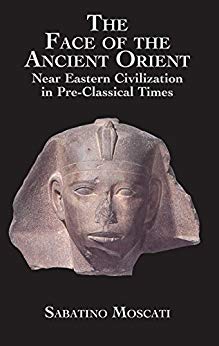Background
Sabatino Moscati was born on November 24, 1922 in Rome, Italy.

Piazza della Pilotta, 35, 00187 Rome RM, Italy
Unable because of racial laws to enroll in the state university, Sabatino Moscati studied at the Pontifical Biblical Institute, graduating in 1945.
Sabatino Moscati at the Balzan Prize Ceremony in Rome in 1996.

(This fascinating, lively study - praised by the American ...)
This fascinating, lively study - praised by the American Historical Review as "a valuable introduction, perhaps the best available in English, to the ancient Near Eastern civilizations" - is essential reading for history students and for anyone interested in the development of Western civilization. The author, who was director of the Center of Semitic Studies at the University of Rome, undertook the study in order to make sense of several enormously important discoveries from the mid-twentieth century - including the discovery of Ugarit, a Syrian city that flourished for 4,000 years; the unearthing of Mari, an equally important city of ancient Mesopotamia; and the discovery of the Dead Sea Scrolls. Professor Moscati begins with a chapter on the "Oriental Renaissance" and goes on to examine the Sumerians, Babylonians, Assyrians, Egyptians, Hittites, Hurrians, Canaanites, Aramaeans, Israelites, and Persians, before offering, in the final chapter, a synthesis of Near Eastern accomplishments in politics, society, literature, and the arts. His conclusion is that "the civilizations of the ancient Orient were a tremendous human experience… without which another, subsequent civilization would not be conceivable".
https://www.amazon.com/gp/product/B00A73AF3M/ref=dbs_a_def_rwt_hsch_vapi_taft_p1_i0
1960
anthropologist archaeologist educator linguist author
Sabatino Moscati was born on November 24, 1922 in Rome, Italy.
Sabatino Moscati was educated in Rome in Semitic languages, including Arabic and ancient Hebrew. Unable because of racial laws to enroll in the state university, he studied at the Pontifical Biblical Institute, graduating in 1945.
Early in his career, Sabatino Moscati was a professor at the University of Florence. After a stint at the Oriental Institute in Naples, he joined the faculty of the University of Rome as a professor of Semitic philology in 1954. He was later named professor of Hebrew and comparative Semitic languages.
Beginning in the late 1940's, Professor Moscati was a regular contributor to several Italian encyclopedias. In 1948, in an effort to purge their pages of the effects of Fascism, he contributed articles on anti-Semitism and the Jews, in which he traced for Italians the history of the Holocaust, including the deportation to the death camps of the Jews from the ghetto of Rome.
He also participated in various excavations. His first occurred in 1957 during a dig to uncover the remains of the fortress of the kings of Judah near Jerusalem, Israel. Later work included excavations of Phoenician forts in Cape Bon and the Punic City of Mt. Sirai in Sardinia.
In all his work, the goal remained to raise from the dead the memory of people whose influence stretched across the millennium from the Old Testament's Canaan to the Punic Wars between Rome and Carthage.
Moreover, Moscati expressed his views in many books. His most widely read work, ''Ancient Semitic Civilizations,'' published originally in Italian in 1958, has gone through numerous reprintings and been translated into many languages.
His interest in the Phoenicians led him to the peoples of Italy whose cultures preceded that of Rome, like the Etruscans, and through them to the Celts of northern Europe. To bring the results of recent research into the history and culture of these peoples to a broader public, Professor Moscati organized notable exhibits at Palazzo Grassi in Venice dedicated to the Phoenicians (1988) and the Celts (1991).
Besides, he established Archeo, an archeological magazine, in 1985.
Among his books are Ancient Semitic Civilizations, The Face of the Ancient Orient: A Panorama of Near Eastern Civilizations in Pre-Classical Times, Ancient Semitic Deities, Historical Art in the Ancient Near East, and The World of the Phoenicians.
Sabatino Moscati has been listed as a noteworthy academic administrator by Marquis Who's Who. Besides, he directed a number of excavations, in the process of which he established himself internationally, winning the Lamarmora Prize for his studies of Sardinia, the Selinon Prize for Sicily, the Sybaris Magna Grecia Prize for his research in ancient Italy and the I cavalli d'oro di San Marco for his oriental work.
(This fascinating, lively study - praised by the American ...)
1960(An introduction to archaeology, its history, methods of e...)
1975Sabatino Moscati was a member of Lincean Academy and Académie des Inscriptions et Belles-Lettres.
Sabatino Moscati married Anna Enrico on October 13, 1929. They had two daughters: Laura and Paola.
